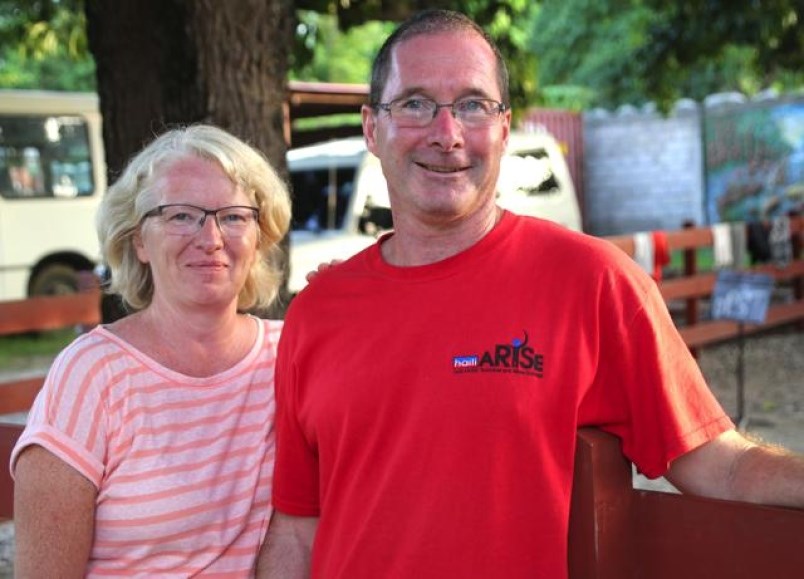For the second time in less than a year, Weyburn couple Wade and Marilyn Fitzpatrick were forced to flee the island nation of Haiti, due to the level of anarchy and violence which has made it unsafe for them to continue ministering there any longer.
The couple work for the mission Haiti Arise for six months of the year at their compound, which is located in the town of Grand Goave, located 65 km west of Port-au-Prince, the capital city.
They had been forced to leave in mid-February over the violent protests against President Jovenel Moise, and they had to leave again for the same reasons, with the situation deteriorating badly in recent weeks, after spending about a month at their compound working on various projects.
“We got to Port-au-Prince airport on Sept. 26, and found nobody could pick us up because the roads were blocked,” explained Wade in an interview on Sunday, noting there is really only one main highway that runs through Haiti.
Besides the Fitzpatricks, there was also a family of six who had planned to spend a year as a family working with Haiti Arise, with a medical team scheduled to come in on Oct. 1. The group hunkered down in a hotel for three days as they tried to figure out how to get to Grand Goave, and they arranged for a community ambulance to come get them as at that time ambulances could still get through the roadblocks.
In “normal” times, the 65-km trip would take about two to three hours, depending on traffic, but with the roadblocks and piles of burning tires, “it’s dangerous. We were in a bad spot.”
The ambulance came and gave the group a ride, but with wires on many of the roads, the differential in the ambulance was damaged and leaking fluids, and they had to stop and search for fluids so the ambulance could keep going.
The group was eventually able to make it to their compound, but found that most everything was shut down, including all of the schools. This included their own schools, although their medical clinic was able to continue operating.
With the unrest and uncertainty over everything, the medical teams scheduled to come in were cancelled, along with two general teams that were to travel in. This was a big blow to Haiti Arise, as these teams often are able to bring in many supplies from Canada and the U.S. that can’t be readily or cheaply bought in Haiti, including medical supplies.
“We started stockpiling diesel, because if you run out of diesel, you can’t operate anything,” said Wade, noting that he and Marilyn worked on projects around the compound that needed doing, and they did this for about three weeks.
The mission’s administrator then told them they really should leave Haiti for their own safety, while they still could leave.
They began to make arrangements to hire a helicopter, since there was no overland way to get to the airport, but the lines for the Internet were cut around this time, making communications difficult. The arrangements for a helicopter involved contacting their office in the U.S. and ensuring payment got to them before the helicopter could come get them.
It took eight days to finalize this arrangement, but eventually they were able to get out, but not before Marilyn and the mother of the family both contracted typhoid. Marilyn’s case was not as severe, and with antibiotics that were on hand at the medical clinic, she recovered from this infection in about a week’s time.
The family of six, meanwhile, are still in Fort Lauderdale, Flo., where the mother is in hospital recovering from her case of typhoid.
The anger in the streets has continued to mount against the president, said Wade, but he said recently he refuses to leave office as he still has two years left in his term. Meantime, many people are starving and are dying, and the streets are getting more and more dangerous as people get more desperate.
“The feeling in Haiti has completely changed. It’s not just the protests, there’s a growing sense of lawlessness there. Someone could block a bridge or a road to get money from people, and the police are powerless to stop it,” he said, noting there are gangs involved in the lawless behaviour also.
At Haiti Arise, some of the Haitian-run aspects of the ministry are still going, such as the church and the work of rescuing children and keeping them safe, although construction projects are on hold due to an inability to secure supplies.
“This is a spiritual deal, in my view. There’s deep corruption, and voodoo is very deeply entrenched. In the midst of that, evangelical churches are doing quite well, and they’re being driven to pray,” said Wade, adding that people’s small businesses are having to close because they have no way of getting supplies any more.
The Fitzpatricks don’t know when or if they will be able to return to work with Haiti Arise, as it all depends how the country pulls out of this situation. Wade commented that it may come to a point where they will have to look for other work to do elsewhere.



